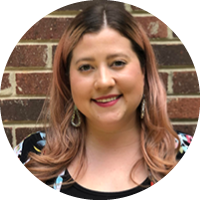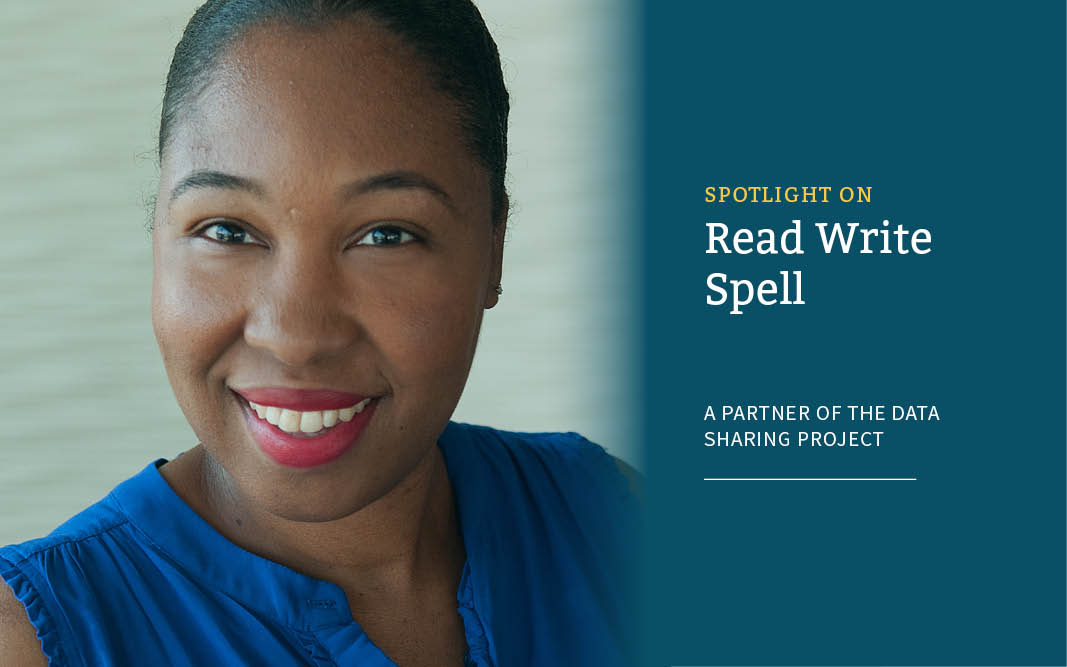
by Christina Spence
Data Sharing Project Coordinator

Esharan Monroe-Johnson, Executive Director of Read Write Spell.
Greetings from The Data Sharing Project, and welcome back to our Partner Spotlight Blog Series! The first quarter of the 2021 – 2022 school year has ended, extended learning programs have launched across the community, and I had the opportunity to sit down with another one of our partners to talk about the work we have been planning. This week, I sat down with Esharan Monroe-Johnson, the Executive Director of Read Write Spell.
The Data Sharing Project (DSP) has been working with Read Write Spell Augustine Literacy Project since the 2018-19 school year. The Augustine Literacy Project provides free, long-term, reading support for students (K-5th) struggling with literacy skills, through one-on-one instruction with highly trained tutors. Read Write Spell also provides professional development opportunities for educators and provides parents with free resources to help strengthen their child’s pre-reading and early reading skills.
Keep reading to learn more about Read Write Spell, their recruitment efforts, and what is on the horizon for the 2021-22 school year!
Who are you and what do you do at Read Write Spell?
I am Esharan Monroe-Johnson, and I’m the Executive Director of Read Write Spell. I started with the organization in 2016 as an Augustine Literacy Project tutor. I joined the staff in 2017 and I’ve held a variety of roles. I’ve done the Parent Education program, been the Marketing and Development Director, the Associate Director, and now Executive Director.
If someone walked up and asked you about the Data Sharing Project, and you only had a couple minutes to talk about the project, what would you tell them?
The thing that I’ve been most impressed with by Data Sharing Project is that they are really committed to doing what they say they’re going to do – and that is Continuous Quality Improvement. DSP is committed to that work, and they will remind you of that. There are lots of benefits of working with DSP, being able to get data being one of them, but ultimately their goal is to provide the data and information for the purposes of continuous improvement for programs. So they keep you focused on that as well.
That is overall one of my favorite things, but then also what I have found from working with DSP this year is that there are all types of ways that they are using technology that we can leverage to use in our work as well. DSP is able to help with that, to train you with that. They have gone above and beyond to help with the recruitment process, which will make this process more efficient for us in the future.
What has been the biggest benefit to your partnership with the Data Sharing Project?
We’ve had some challenges, you know, during COVID. Because of the type of programming that we had everything was kind of on pause, but I would say that the biggest benefit, and the thing that I’m looking most forward to doing, is the program evaluation and learning from that this year. I think DSP brings a lot of skill, a lot of intentionality, to planning at the beginning of the process, so that you get answers to questions you have about program impact and the kind of data that you are interested in seeing the end.
For example, Augustine has been around for 20 years, and we know that it works, and we have our assessment information and anecdotal data, but what I’m really looking forward to is seeing under what type of conditions is Augustine most helpful. Knowing what type of student and what type of tutor behaviors led to successful outcomes will be valuable. We also just started a new program called Reading Foundations, and we are looking to get an initial evaluation and look at that program because we’ve never done it before.
What has been your biggest learning from your partnership with the Data Sharing Project?
My biggest learning has been to stay the course and trust the process. And stay committed to it. It can take time to get to the end results that you are looking for, and it may take multiple years for us to figure out the larger questions that we have from a program evaluation standpoint, but we’re going to stay the course.
What do you hope to accomplish through your continued partnership with the Data Sharing Project?
We learned a lot through the recruitment process that you helped us with. One, that we did not give the best information up front about the type of student that we need, because we were so focused on the data, we didn’t look at the other things. We’ve learned a lot about what to communicate to your team, and gotten assistance in communicating to schools. From my viewpoint the recruitment help is a game changer for us because even though it didn’t work perfectly this year, once we make the improvements, I know that that’s going to be one of the biggest benefits for us. Being able to get students enrolled earlier and streamline the way we work with teachers is huge. This also gives a clear message to the community about how we recruit students. We can target students through the project, based on data, and then we reach out to teachers about the students we are working with. It cuts out some of the work teachers have done in the past as far as referrals, so it is also saving them time. So it has streamlined our process and made it more intentional.
Is there anything else you would like to add?
I don’t know what the community knows already about DSP, but one thing that would be helpful for the community to know, is that the name does not really capture what it really is. I mean, you definitely share data. But y’all do so much more than that. It’s part of it, with the intended goal and purpose in mind, but it’s really about helping programs get better and better every year so that you can serve students more effectively. It is about Continuous Quality Improvement. And I think that commitment really comes through in the work.
If you would like more information about Read Write Spell’s services, or would like information about how to become a tutor, visit their website.
A Call to Action! In addition to their one-on-one student supports, Read Write Spell, WS/FCS, and Project Impact have joined forces to organize an army of Reading Warrior volunteers. They are looking for people like you, who know that our community’s success depends on our children’s success, to volunteer to help meet the WS/FCS 3rd grade reading goal to have 90% of third-graders test as proficient readers by the end of the 2024-25 school year. Helping students to learn to read is a community commitment to closing the achievement gap and ensuring students have what they need to thrive in school, in work, and in life. If you would like to learn more about Reading Warriors, or are interested in volunteering, click here!
Thank you checking in for another partner spotlight! If you are interested in learning more about the Data Sharing Project, or know of a program in Forsyth county that may benefit from a partnership with us, be sure to check out our website, and reach out to me, Christina Spence, at [email protected].
Until Next time!
